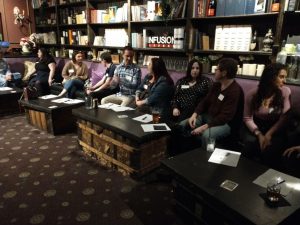
Valentine’s Day — far from a Jewish holiday — is over, and Tu B’Av, the Jewish holiday of love, isn’t for months. But love is still in the air for Jewish Philadelphians.
On Feb. 16, Be Single No More, founded by Jewish owner Susan Mitchell, hosted a speed dating event for 20- and 30-something Jewish singles; it’s just one example of how single people, fed up with apps, are not only looking to meet their match in person but also in a Jewish environment.
“There’s just such a need in our community, to bring a place, in person, that people can meet and connect,” Mitchell said. “Especially when it comes to dating in community, you really want to see people in person and have that connection.”
At the event, hosted at the Infusion Lounge in Old City, Mitchell sees attendees, about 20-35, not only schmoozing, but connecting Jewishly, talking about their bar and bat mitzvahs or favorite Jewish foods. Some even recognize each other from Hebrew school decades prior.
It’s a reminder to Mitchell that dating in person isn’t such a lost art, especially in a world where dating apps, albeit frustrating, are the norm.
“When you’re at a speed dating, what you see is what you get,” she said. “There’s no catfishing; the person isn’t wearing a mask; the picture isn’t 20 years old. Like it’s them. It’s who they are.”
Michal Naisteter, a Philadelphia-based Jewish matchmaker, has made similar observations.
“I feel like 99 out of 100 people haven’t necessarily enjoyed the apps,” she said.
On dating apps, people are impatient, often swiping left (declining a profile) at first glance of any negative trait. In person, you’re more likely to have patience with a person who’s not your type.
“When we used to meet people at bars or in public, we didn’t look at them as these checklists and data points and things like that,” Naisteter said. “We would look at who the whole person is.”
Gavi Weitzman, a 20-something artist in Philadelphia, has experienced little success on dating apps since joining apps such as Hinge and Bumble.
“It’s so hard to tell if you actually connect with someone online because you’re seeing a very curated version of them,” Weitzman said. “You don’t hear their voice or hear their inflections; you don’t hear how funny they are or how they look at you, and those are all things, I think, that inform your attraction to someone.”
But despite little success with dating apps, many people continue to use them.
“They’re easy,” said Michael Spanier, a Jewish Haddonfield, New Jersey, resident. “You can do it from the couch. You can do it late at night, when you only have a moment, as opposed to waiting for certain Friday night events.”
Apps such as Hinge also have a free option to select only Jewish options. While other apps such as JDate or Lox Club are made for Jewish users, the subscription fees and smaller dating pool make them less appealing to Spanier.
While the easiness of dating apps is part of the appeal, it’s also a big reason why they’re frustrating, according to Spanier.
“That’s the issue,” he said. “It’s so easy, people are putting very little energy or effort into it.”
If there’s a speed dating or singles event, attendees will get dressed up and give themselves a pep talk before stepping out of the house. The greater the stakes for going out and meeting people, the more effort someone is likely to put in.
But in person or online, there are still plenty of Jews wanting to access exclusively Jewish dating spaces, which has benefits to them, regardless of the medium they use. In a world of endless scrolling and myriad of singles events, finding a more curated community to begin dating efforts makes the process less intimidating.
“This is a culture I come from. This is important to me,” Spanier said. “I’ve noticed that there’s a lot more to relate to.”
Naisteter refers to Jewish dating spaces as a “safe container,” a feeling that can continue in more serious relationships.
“Being Jewish is just such a huge part of my life,” Weitzman said. “And if someone doesn’t have that history, then I feel like it’s very hard to understand who I am. I don’t want to have to explain myself to someone. I want someone to also have that love for going to shul or know what Yom Kippur is all about.”






